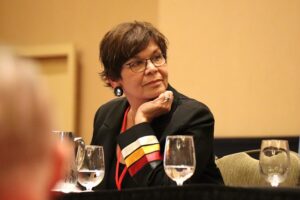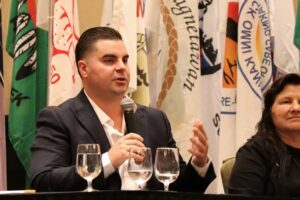Chippewas of Rama First Nation citizens featured on Business Development Panel at economic development forum

By Sam Laskaris
CHIPPEWAS OF RAMA FIRST NATION – Mary-Anne Willsey has had her share of accomplishments during her professional career.
And Willsey, who is the general manager of economic development in Chippewas of Rama First Nation, shared her thoughts about some of those successes as she was one of the featured speakers during a recent event held in her First Nation.
Willsey was part of the Business Development Panel during the 2nd Annual Anishinabek Nation Economic Development Opportunities Forum, which concluded Oct. 23 at Casino Rama Resort.
Willsey was a key member of the Chippewas of Rama casino, which opened in 1996. Later on, she was a member of teams that opened casinos in Vancouver and Toronto.
Kyle Matthews, the economic development manager for Chippewas of Rama First Nation, also spoke at the Forum’s Business Development Panel.
Working alongside Matthews, Willsey said the primary goal was to have Chippewa of Rama’s businesses make money.
“It had been previously thought that the businesses in Rama, because the casino was here, they were just needed really to provide employment,” she said. “But employment without success isn’t really employment because how do you feel if you’re sitting around the campfire and your cousin says to you, ‘Yeah, you work at the Rama Country Market but that loses money every year’?”
Willsey said this year marked the first time the market has made a significant profit.
“Our belief, as we migrated our economic development to build revenue for our community, is that there cannot be any economic sovereignty for our First Nation without economic independence in its people,” she said. “The whole is not healthy unless all the parts are. So, we work very closely on the parts.”

Matthews said there are two main types of economic development in his First Nation. The first is income generating. And the second is a business venture that creates jobs and careers, develops training and skill training and equity partnerships.
Matthews also said it is important to provide meaningful work to members and make them feel valuable.
“Our big thing is that we want people to go home and feel good about the work they’re doing,” he said.
Chippewas of Rama officials are doing their best to change the narrative by having their employees talk about how positive their work is. Matthews said this will prove beneficial to the next generation as well.
“Youth are really the foundation of economic development and developing our next generation and our future,” he said.
For example, he mentioned the local Tim Hortons franchise.
“We really view it as a launchpad for some of our youth,” Matthews said. “For some, it’s their first job.”
And in the process, they get to learn about customer service, communication skills, and time management.
“It’s not an easy job,” Matthews said, adding not all customers are as friendly as hoped. “It’s having that resilience to push through and to be there as a team to get through it together.”
Willsey said others have plenty to do when it comes to economic reconciliation.
“Our on-reserve members, who have not functioned well in the colonized world, are not accustomed to the colonized world,” she said. “Unless businesses are prepared to alter how they train, mentor, and socialize our members who have not previously been successful, they’re not going to be. Truth and reconciliation comes with recognizing the traumas that exist within some of our membership and be willing to make amends for that.”
Willsey added it is rather important that Indigenous entrepreneurs also recognize who they partner with.
“They need to mirror your values, they need to mirror your beliefs,” she said. “But most of all they need to believe in your people.”
The panel also included Jason Thompson, a member of Red Rock Indian Band and president of three businesses: Superior Strategies Inc., Warrior Engineering Ltd., and All 3 Innovation. All three companies are majority Indigenous-owned businesses.
Stephanie Zilinski, a member of Kitigan Zibi Anishinabeg First Nation in Quebec, was also a panelist. Zilinski, who worked various roles for the Ontario government for more than three decades, is now a consultant for First Nations.

